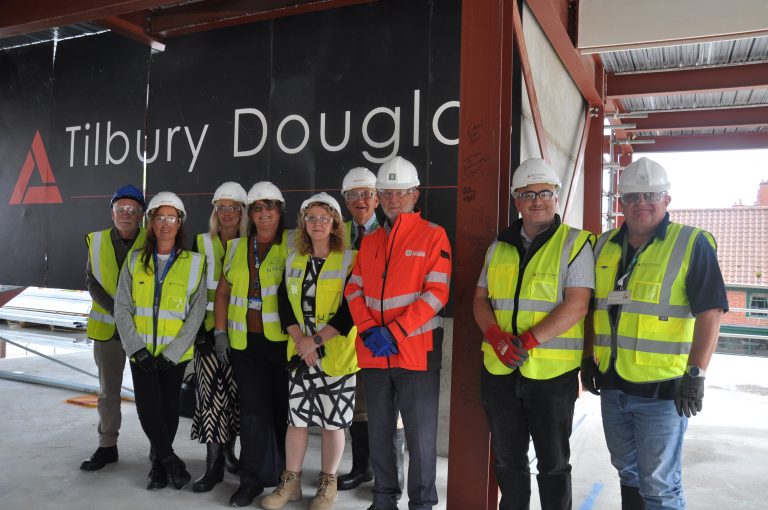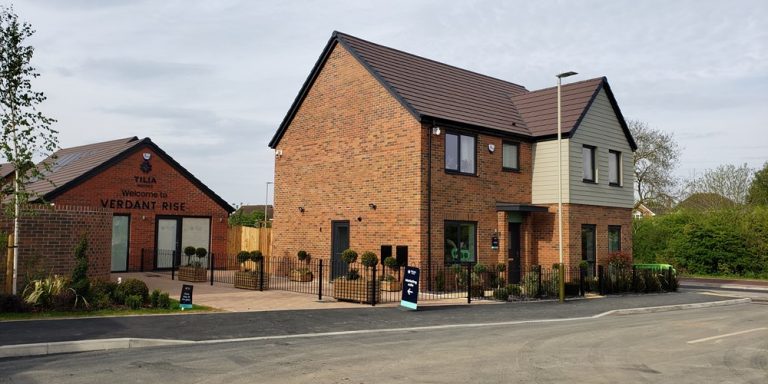G F Tomlinson is a privately owned business, operating through central England and is known as one of the Midlands’ most respected and recognised brands in the industry.
Formed in 1892, the business has over 130 years of experience and offers a truly collaborative approach to project delivery, resulting in long-term working relationships and high levels of client satisfaction through the completion of exceptional quality projects, to programme, within budget and in a safe manner.
With their high calibre of personnel and organisational capacity, they have the confidence to tackle the most demanding of projects through the adoption of a “can do” attitude at all times. Their in-house services include pre-construction advice, risk management, feasibility support and value management, helping to provide a greater level of certainty on key project drivers.

Using their knowledge and experience supported by their supply chain partners, they are able to work across a broad portfolio of construction projects within the public and private sectors, including, education, commercial, healthcare, heritage, leisure, civic, retail and industrial.
The company has been involved in several iconic buildings of late from the development of the Sutton on Sea Colonnade and Pleasure Gardens to the restoration and refurbishment of the Grade II listed Central Building at Castle Meadow Campus, Nottingham, and the delivery of the new Science Discovery Centre and Planetarium in Mansfield, showing how G F Tomlinson’s impact can be felt across the region.
The business is also involved in several public sector frameworks with organisations such as Scape, Pagabo, Crown Commercial Services, Department for Education, Constructing West Midlands, NEUPC, NHS Shared Business Services, Procure Partnerships and the University of Birmingham.

An award winning company, G F Tomlinson operate tried and tested UKAS accredited systems, including ISO 14001:2015 Environmental Management System, ISO 45001:2018 Occupational Health and Safety Management System and ISO 9001:2015 Quality Management System. They are a member of the Considerate Constructors Scheme and accredited to Constructionline Gold demonstrating their high attainment of best practice in the industry.
Through the delivery of their projects, G F Tomlinson drive social-economic and environmental benefits into the communities in which they work. In the last 12-months they have provided £12.7m of social value added opportunities across 18 projects, totalling £49.2m which equates to 26% against project costs.
They work with local schools and colleges to promote careers in construction and offer career and skills advice, along with work experience placements and apprenticeship opportunities and currently employ and support 12-in-house technical apprentices.

The company support many worthwhile causes locally which include the University of Nottingham’s para and inclusive wheelchair basketball group, Switch Up Nottinghamshire and Treetops Hospice, demonstrating their commitment to giving something back to the communities they work in.
G F Tomlinson has had a Carbon Reduction Plan in place since their Baseline year of 2019 and measure Scope1 and Scope 2 GHG emissions year on year. Since this introduction the company has seen a 17% reduction in carbon usage and by 2027 they anticipate usage to reduce to 235tCO2e with the target to be Net Zero emissions by 2035.
G F Tomlinson are aware of the impacts of mental health and offer guidance and support to their employees and supply chain partners through their team of in-house specialised trained Mental Health First Aiders (MHFA). The Company also offer a ‘Private Health Scheme’ (WPA) which provides confidential support, advice, and treatment for its employees physical and mental health.

Regular site initiatives are held to support the wellbeing of the workforce. One recent initiative includes organised site visits from The Lighthouse Construction Industry Charity. As part of their ‘Make it Visible’ campaign, which aims to make welfare and well-being support visible on every construction site, all site personnel paused work to engage with the Lighthouse team about mental health and well-being.
G F Tomlinson are an award-winning contractor, having been presented with multiple prestigious awards over the years. Most recently their project – the Air and Space Institute (ASI) for Lincoln College Group. The project comprised the design and construction of the new state-of-the-art Air and Space Institute (ASI), accommodating a full-size Airbus A318. The facility was crowned ‘Building Project of the Year’ at the Constructing Excellence Awards 2024, ‘Construction Project of the Year’ at the East Midlands Property Dinner Awards 2024 and ‘Commercial Development of the Year’ at the East Midlands Bricks Awards 2024.
For more information on G F Tomlinson, please visit:
https://gftomlinson.co.uk/ 



 Using their knowledge and experience supported by their supply chain partners, they are able to work across a broad portfolio of construction projects within the public and private sectors, including, education, commercial, healthcare, heritage, leisure, civic, retail and industrial.
The company has been involved in several iconic buildings of late from the development of the Sutton on Sea Colonnade and Pleasure Gardens to the restoration and refurbishment of the Grade II listed Central Building at Castle Meadow Campus, Nottingham, and the delivery of the new Science Discovery Centre and Planetarium in Mansfield, showing how G F Tomlinson’s impact can be felt across the region.
The business is also involved in several public sector frameworks with organisations such as Scape, Pagabo, Crown Commercial Services, Department for Education, Constructing West Midlands, NEUPC, NHS Shared Business Services, Procure Partnerships and the University of Birmingham.
Using their knowledge and experience supported by their supply chain partners, they are able to work across a broad portfolio of construction projects within the public and private sectors, including, education, commercial, healthcare, heritage, leisure, civic, retail and industrial.
The company has been involved in several iconic buildings of late from the development of the Sutton on Sea Colonnade and Pleasure Gardens to the restoration and refurbishment of the Grade II listed Central Building at Castle Meadow Campus, Nottingham, and the delivery of the new Science Discovery Centre and Planetarium in Mansfield, showing how G F Tomlinson’s impact can be felt across the region.
The business is also involved in several public sector frameworks with organisations such as Scape, Pagabo, Crown Commercial Services, Department for Education, Constructing West Midlands, NEUPC, NHS Shared Business Services, Procure Partnerships and the University of Birmingham.
 An award winning company, G F Tomlinson operate tried and tested UKAS accredited systems, including ISO 14001:2015 Environmental Management System, ISO 45001:2018 Occupational Health and Safety Management System and ISO 9001:2015 Quality Management System. They are a member of the Considerate Constructors Scheme and accredited to Constructionline Gold demonstrating their high attainment of best practice in the industry.
Through the delivery of their projects, G F Tomlinson drive social-economic and environmental benefits into the communities in which they work. In the last 12-months they have provided £12.7m of social value added opportunities across 18 projects, totalling £49.2m which equates to 26% against project costs.
They work with local schools and colleges to promote careers in construction and offer career and skills advice, along with work experience placements and apprenticeship opportunities and currently employ and support 12-in-house technical apprentices.
An award winning company, G F Tomlinson operate tried and tested UKAS accredited systems, including ISO 14001:2015 Environmental Management System, ISO 45001:2018 Occupational Health and Safety Management System and ISO 9001:2015 Quality Management System. They are a member of the Considerate Constructors Scheme and accredited to Constructionline Gold demonstrating their high attainment of best practice in the industry.
Through the delivery of their projects, G F Tomlinson drive social-economic and environmental benefits into the communities in which they work. In the last 12-months they have provided £12.7m of social value added opportunities across 18 projects, totalling £49.2m which equates to 26% against project costs.
They work with local schools and colleges to promote careers in construction and offer career and skills advice, along with work experience placements and apprenticeship opportunities and currently employ and support 12-in-house technical apprentices.
 The company support many worthwhile causes locally which include the University of Nottingham’s para and inclusive wheelchair basketball group, Switch Up Nottinghamshire and Treetops Hospice, demonstrating their commitment to giving something back to the communities they work in.
G F Tomlinson has had a Carbon Reduction Plan in place since their Baseline year of 2019 and measure Scope1 and Scope 2 GHG emissions year on year. Since this introduction the company has seen a 17% reduction in carbon usage and by 2027 they anticipate usage to reduce to 235tCO2e with the target to be Net Zero emissions by 2035.
G F Tomlinson are aware of the impacts of mental health and offer guidance and support to their employees and supply chain partners through their team of in-house specialised trained Mental Health First Aiders (MHFA). The Company also offer a ‘Private Health Scheme’ (WPA) which provides confidential support, advice, and treatment for its employees physical and mental health.
The company support many worthwhile causes locally which include the University of Nottingham’s para and inclusive wheelchair basketball group, Switch Up Nottinghamshire and Treetops Hospice, demonstrating their commitment to giving something back to the communities they work in.
G F Tomlinson has had a Carbon Reduction Plan in place since their Baseline year of 2019 and measure Scope1 and Scope 2 GHG emissions year on year. Since this introduction the company has seen a 17% reduction in carbon usage and by 2027 they anticipate usage to reduce to 235tCO2e with the target to be Net Zero emissions by 2035.
G F Tomlinson are aware of the impacts of mental health and offer guidance and support to their employees and supply chain partners through their team of in-house specialised trained Mental Health First Aiders (MHFA). The Company also offer a ‘Private Health Scheme’ (WPA) which provides confidential support, advice, and treatment for its employees physical and mental health.
 Regular site initiatives are held to support the wellbeing of the workforce. One recent initiative includes organised site visits from The Lighthouse Construction Industry Charity. As part of their ‘Make it Visible’ campaign, which aims to make welfare and well-being support visible on every construction site, all site personnel paused work to engage with the Lighthouse team about mental health and well-being.
G F Tomlinson are an award-winning contractor, having been presented with multiple prestigious awards over the years. Most recently their project – the Air and Space Institute (ASI) for Lincoln College Group. The project comprised the design and construction of the new state-of-the-art Air and Space Institute (ASI), accommodating a full-size Airbus A318. The facility was crowned ‘Building Project of the Year’ at the Constructing Excellence Awards 2024, ‘Construction Project of the Year’ at the East Midlands Property Dinner Awards 2024 and ‘Commercial Development of the Year’ at the East Midlands Bricks Awards 2024.
For more information on G F Tomlinson, please visit:
Regular site initiatives are held to support the wellbeing of the workforce. One recent initiative includes organised site visits from The Lighthouse Construction Industry Charity. As part of their ‘Make it Visible’ campaign, which aims to make welfare and well-being support visible on every construction site, all site personnel paused work to engage with the Lighthouse team about mental health and well-being.
G F Tomlinson are an award-winning contractor, having been presented with multiple prestigious awards over the years. Most recently their project – the Air and Space Institute (ASI) for Lincoln College Group. The project comprised the design and construction of the new state-of-the-art Air and Space Institute (ASI), accommodating a full-size Airbus A318. The facility was crowned ‘Building Project of the Year’ at the Constructing Excellence Awards 2024, ‘Construction Project of the Year’ at the East Midlands Property Dinner Awards 2024 and ‘Commercial Development of the Year’ at the East Midlands Bricks Awards 2024.
For more information on G F Tomlinson, please visit: 

















